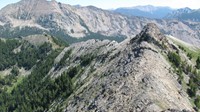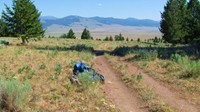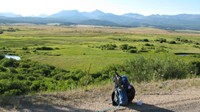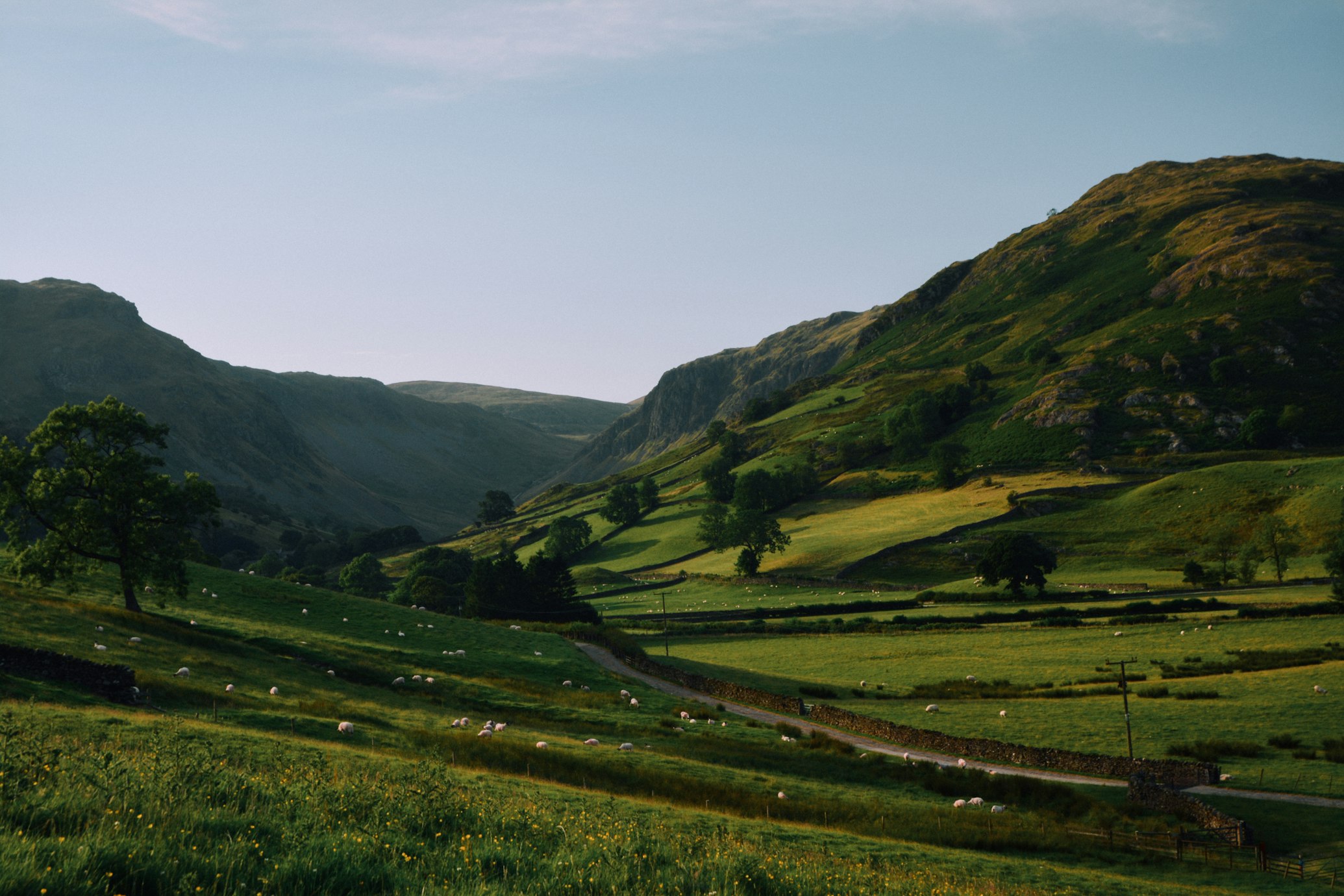June 2007: As exciting as it is to yo-yo the CDT, it's boring to read journals about everyday life on the trail. After all, I'm just walking. Yes, walking 9,000 km is a lot, but it's still walking. I think you'd rather hear interesting thoughts I had during these 7 months in the wilderness.
Whenever I run into a wilderness outhouse, I want to thank the ranger who puts toilet paper in it.
I've already shared some of my contemplations, like compressing Earth's history into a year and what it means to be human. So now, let's tackle global warming. I encourage you to set aside 10 minutes to read it because you’ve probably not heard this kind of thinking. Only a screwball who has been hiking in the woods too long can think like this...
A climate change debate between a human and a T-Rex
I contemplated the global climate change debate during my long hikes through the CDT. My views on the issue are unconventional, especially for a backpacking nut.
Nature lovers are supposed to jump on the environmental bandwagon and fight to protect the climate’s status quo. I don’t jump on bandwagons so quickly. Unless they’re going to town and I need more food.
I arrived at my unorthodox views after having an imaginary global warming debate with a Tyrannosaurus Rex that used to hunt in Montana, the state I’m now hiking in.
Here’s a transcript of the conversation:
FRANCIS: Hey, T-Rex, lately, many humans have been debating about the issue of climate change. What’s your take on it?
T-REX: Well, there are plenty of skeptics out there. But let’s assume that global warming is not only happening but that 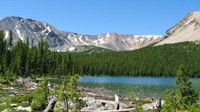
(1) Is global warming good or bad for the planet as a whole?
(2) Is global warming good or bad for Homo sapiens as a whole?
FRANCIS: The answer for both of those is obviously “bad.”
T-REX: Really? Why are you so sure? Let me give you the perspective of the beasts that dominated this planet for over 150 million years (your species has only been around for 100,000 years). I’ve got a couple of tough questions for you, but first, let’s review some history:
- In the last 1.6 million years, we’ve been in an ice age.
- Since all previous ice ages lasted tens of millions of years, our present ice age will continue for a while (unless human activity can overwhelm the forces of nature).
- Ice ages are punctuated with glaciations that last for about 100,000 years and then a warming (interglacial) period that lasts for about 10,000 years.
- After the warm period, we plummeted into a glacial period of 100,000 years. Each glaciation begins slowly and may take 80,000 years or more to reach its maximum extent.
- Rapid melting of these expanded glaciers within just a few thousand years follows.
- Then the next glaciation begins to build only 10,000 to 20,000 years after the maximum of the previous glaciation occurred.
- We live in one of the warming periods of the 100,000-year glacial-interglacial cycles.
- It’s been 10,000 years since the last glacial period, so we are due for another cooling.
- This corroborates the fact that before the human-induced global warming of the last two centuries, the climate had been cooling for several thousand years.
FRANCIS: Wow, that’s pretty confusing. Seems like 10-20% of an ice age is relatively warm and 80-90% of it is butt cold. For the last 10,000 years, we’ve been in that warm period, so we’re due for a cool period.
T-REX: Right. However, my question to you is: are the forces (which nobody fully understands) that cause these glaciation cycles stronger than the human forces causing global warming?
FRANCIS: That’s a good question. Maybe Al Gore knows the answer.
T-REX: In other words, will the forces that have caused global cooling in the past overrule whatever effort humans are making to heat the planet?
FRANCIS: We may underestimate the forces that typically push us into a 100,000-year glaciation period. Why does the Earth go through such cycles anyway?
T-REX: Nobody knows! The Milankovitch Astronomical Theory and the Sea Level theory attempt to explain why we have these ice age cycles. The Milankovitch Theory argues that the cause is a more elliptical orbit and swings in the planet’s tilt that trigger ice ages. What causes that is not clear.
FRANCIS: OK, so how does the Sea Level Theory explain why we have these colossal temperature swings without human assistance?
T-REX: The Sea Level Theory observes that the global sea level affects the planet's overall temperature because solar radiation is better absorbed by water than by land. When sea levels are low, more land surface becomes exposed. Since the land cannot absorb as much solar radiation as the water can, the overall average temperature of the planet decreases, contributing to a new ice age.
FRANCIS: That makes sense. But nobody knows which theory is correct.
T-REX: True, but whatever the root cause of glacial and interglacial periods, is that force more powerful than a bunch of primates tossing billions of tons of CO2 in the air?
FRANCIS: Hey! As far as primates, we’re pretty cool. We have cell phones and showerheads with adjustable settings.
T-REX: Do you trust your 5-day or 10-day forecast?
FRANCIS: Only in Los Angeles, where it’s always sunny.
T-REX: Isn’t it funny that humans don’t trust their 5-day forecasts but somehow believe meteorologists and scientists making 50-year forecasts? Isn’t it odd that you don’t know why temperatures have fluctuated so violently in the past, and yet you think you know where the temperatures will go in the future? No wonder they’re calling it "climate change" and not "global warming." It gives them far more leeway.
FRANCIS: You’re a cynical old fart. No wonder you went extinct.
T-REX: Easy there, I’m bigger than you.
FRANCIS: Yes, your Worship.
T-REX: Anyway, let’s assume they’re right. Let’s revisit my initial two questions. Is global warming a net good for the planet? Let’s define what “net good” means. Take a stab...
FRANCIS: If global warming causes life to abound in quantity and diversity, it’s good. If global warming causes a net decrease in biomass and the amount of diversity, then it’s bad.
T-REX: Sounds like a fair definition to me. So is global warming good for the planet Earth?
FRANCIS: Well, the inconvenient truth is that it’s not good for the globe.
T-REX: I’d say that's the incorrect truth.
FRANCIS: Huh? Why?
T-REX: What causes global warming?
FRANCIS: Increasing greenhouse gases in the atmosphere.
T-REX: Why do you call them “greenhouse” gases?
FRANCIS: Because they create a similar effect as a greenhouse.
T-REX: What the hell is a greenhouse? We didn’t have such houses 65 million years ago.
FRANCIS: They’re glass houses that humans have built to help plants grow fast and healthy. They’re warm, humid places.
T-REX: Nice! Sounds like home to me. When my dino buddies and I ruled this planet, that’s precisely the environment we had. There was little difference between winter and summer. It was always hot. There was no permanent ice anywhere! Life flourished in the Jurassic Period. I look at your world now, and it looks dead in comparison. Aren’t there any places on your planet that are warm and humid?
FRANCIS: Yeah, the Amazon, some rainforests in Indonesia, and New York City in the summer.
T-REX: I bet those places are teeming with life.
FRANCIS: True. The diversity of plant species in the Amazon is the highest on earth, with experts estimating that one square kilometer may contain over 75,000 tree types and 150,000 species of higher plants. Animal diversity there is also extraordinary.
T-REX: What about the coldest places on the earth?
FRANCIS: There’s life, but not much. The biomass and diversity of the Arctic don't compare to what exists in warm, humid places like the jungles of Costa Rica.
T-REX: What about the oceans? Is there more aquatic life in the Arctic or by the volcanic vents and coral reefs?
FRANCIS: In warm places. Biologists note that coral reefs make up 1% of the oceans but account for 25% of life. Also, I heard one marine biologist say there is more biomass along the ocean vents than the rest of the ecosystems on Earth! Unbelievable.
T-REX: So, do you see why global warming isn’t necessarily bad for Earth? Perhaps it will result in a net good? Didn’t you hear the news that a couple of years ago, they found evidence of an ancient tropical bird in the Arctic? It was far warmer back in our day, and life was booming everywhere. If life wasn’t prolific, dinosaurs, with our tremendous appetite, could never have survived for 150 million years. We ate more than you thru-hikers...
FRANCIS: Hard to imagine. But what happens to the polar bear and the penguins if the planet warms?
T-REX: Fuck them. A warm environment will help evolve dozens of new exotic species to take their place. Also, the habitat for bears, squirrels, deer, elk, and evergreens will expand dramatically as life invades Canada, Siberia, Alaska, and Scandinavia. Those regions, which today harbor a relatively modest amount of life, will see a flourishing of biomass, both in diversity and quantity.
FRANCIS: I can’t believe you don’t pity the polar bear.
T-REX: He’d be a snack in my day.
FRANCIS: OK, but won’t some life on the earth go extinct with all this climate change?
T-REX: Of course! Species come and go all the time! Did you know that over 99% of all the species that ever existed on this planet are now extinct?
FRANCIS: Whoa. That’s a statistic worth remembering.
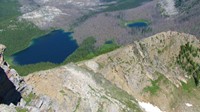
FRANCIS: I’m still unconvinced it would be good for the earth.
T-REX: OK, think of it this way: let’s imagine you’re God...
FRANCIS: I like such an assumption...
T-REX: Should I crush you now or later?
FRANCIS: Yeek!
T-REX: Now you sound like a mouse. If you were God and you could set the Global Thermometer to any temperature you desired, and you wanted to set the optimum temperature for the Earth, what temperature would you set? Would you set it at the current temperature, higher or lower? Assume your goal is to have life flourishing both in quantity and diversity.
FRANCIS: I would want more of the earth to be like the Amazon than Antarctica.
T-REX: Right! See, that tiny brain of yours isn’t so stupid. You’d want the temperature to be closer to the temperature it was at the time of the dinosaurs. That would be the optimum temperature for the planet. Right now, the planet is too cold.
FRANCIS: But some people speculate that Venus was a nice place before greenhouse gases spiraled out of control. Now it’s such a hostile planet that no spacecraft has been able to land and survive there for more than a few minutes before getting crushed to death by the pressures. That’s where we could be heading!
T-REX: Earth’s mean temperature is 15 degrees Celsius. The scariest predictions claim that the average global temperature could rise to 20 degrees. It was 22 degrees during my day, and life was grand.
FRANCIS: Yeah? But what about Venus and the runaway greenhouse effect?
T-REX: The average temperature on Venus is 800 degrees. Too much warming is a bad thing for life. However, no credible scientist is predicting global temperatures above 22 Celsius. Worry about other things than becoming the next Venus.
FRANCIS: OK, I will. I worry that global warming could increase deserts too. Just because it’s hotter doesn’t mean it will be hot and humid. It could be hot and dry. And life doesn’t flourish in hot, dry places like the Sahara. I walked through the hot and dry land of New Mexico and the Great Divide Basin in Wyoming. Neither of them was teeming with life.
T-REX: True, but is a greenhouse hot and dry or hot and humid?
FRANCIS: Just because scientists call it the “greenhouse effect” doesn’t mean it will be hot and humid everywhere.
T-REX: Yes, but there will be a net increase in hot and humid places and a net decrease in frozen wastelands. Therefore, the greenhouse effect will result in a net increase in the quality and diversity of life on earth.
FRANCIS: Fine, I’ll agree with you.
T-REX: It’s always a good idea to agree with a Tyrannosaurus Rex.
FRANCIS: Nevertheless, you gotta admit that global warming will create new hot deserts and expand existing ones.
T-REX: I’ll agree. However, not all deserts are devoid of life. The Kalahari Desert has some fascinating life forms, yet it's a desert. Lions, impalas, cheetahs, elephants, and other mammals live in this desert. Australia's outback also has plenty of marsupial life. You don’t have that diversity or biomass in Antarctica’s frozen desert.
FRANCIS: Fair enough.
T-REX: Moreover, will you agree that in the next 50 years, a competent team from the Middle East will come up with a technological breakthrough that will lead to dramatically lower desalinization costs?
FRANCIS: I agree since they're the leading users in the desalinization industry.
T-REX: Exactly. And they’ll probably invent solar desalinization that will let you cheaply water a desert environment, transforming it into a rich oasis full of life. That would be good for the planet.
FRANCIS: OK, forget the damn planet. All that matters is humans!
T-REX: Now you’re talking like a true representative of a species! Go on...
FRANCIS: Even if global warming is good for the overall planet, it’s still bad for Homo sapiens. It’s going to disrupt our comfortable life everywhere. Fortunately, satellite TV should still work...
T-REX: Hold on. Let’s define what is “good” for the human species.
FRANCIS: All right. I suppose I should think broadly. Let’s say that global warming would be a net good if it allowed our species to reproduce more and our quality of life wasn’t compromised. Global warming would be bad if our species' population declined dramatically or our quality of life plummeted.
T-REX: Great. So what’s the best temperature for you puny humans? Is it better to live in Siberia or Seychelles? Would you rather try to raise plants and livestock in northern Greenland or Hawaii?
FRANCIS: I hate your questions, Dino.
T-REX: Where is the highest density of humans?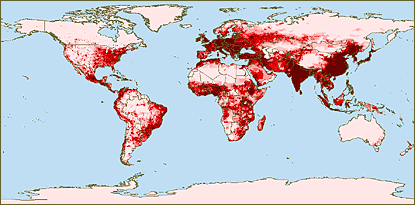
FRANCIS: China, India, Europe, and Nigeria. Yes, I've seen the world map that shows human population density (on the right). I know you’re going to point out that humans prefer to live in warm places, not Siberia, Alaska, Canada, and Antarctica.
T-REX: Right, so your habitat will expand by raising the global temperature a couple of degrees. This would be a net good thing for your species.
FRANCIS: But what about global flooding? Hurricanes? Vanishing glaciers?
T-REX: Unlike other species, you guys can prepare for such changes. For global flooding: sell your condo in Miami and move out of Bangladesh. You guys have an advantage for hurricanes that we dinos didn’t. We always had hurricanes during the Mesozoic Era and never saw them coming. With your weather satellites, you have several days of warning.
FRANCIS: We learned with Hurricane Katrina that four days might not be enough warning.
T-REX: That’s your fault. You’re idiots. You’ll learn.
FRANCIS: But as a backpacker, I appreciate glaciers.
T-REX: What’s a glacier?
FRANCIS: I guess you didn’t have any back in your time. It was too warm. A glacier is a large, slow-moving river of ice formed from compacted layers of snow that slowly deforms and flows in response to gravity.
T-REX: It doesn’t sound like a place I’d want to be. Listen, your biggest doom and gloom scientists are predicting only a 5-degree rise in temperatures. That means glaciers will still exist in northern Alaska and Antarctica.
FRANCIS: But I like that they’re in Glacier National Park.
T-REX: Oh no. You might have to rename your stupid park. Listen, you fool, you’re living in an interglacial period, a warm period during an ice age. That means that glaciers were everywhere 20,000 years ago. Do the folks living in New Mexico, Maine, and Europe miss them now?
FRANCIS: Not really.
T-REX: Right. You adjust and get used to whatever you grow up in. Do the Guatemalans lament that their volcanoes aren’t snow-capped like those in Oregon?
FRANCIS: I doubt the average Guatemalan is even aware that their mountains were snow-capped 15,000 years ago.
T-REX: And they probably appreciate that they can climb those mountains any time of the year without dying of hypothermia.
FRANCIS: But I like snow-capped mountains.
T-REX: Shut up, you hypocrite. I read your journals. You were whining like a baby about all the snow in Colorado.
FRANCIS: Sure, but I can’t imagine Colorado without snow year-round.
T-REX: Your backpacking season in Colorado is short: June to September. Warm up the Earth a couple of degrees, and you’ll get a couple of extra months of backpacking. So quit complaining.
FRANCIS: Yeah, but the desert hiking may be drier than ever.
T-REX: You’ll get used to that too. Look at where you find all my dino buddies in Wyoming. They’re in massive deserts, like the Badlands of Montana. Those places that are deserts today were lush forests back then. Deserts come and go. Deal. Put out more water caches or find a different trail.
FRANCIS: Fine, but what about the global flooding that global warming will cause?
T-REX: Sure, coastal cities will flood, just like Venice. Your species dealt with much bigger floods and climate change 11,000 years ago when the planet came out of a glacial period. Your species was much more fragile then, but you dealt with it.
FRANCIS: But won’t we see collapses, pandemics, and pandemonium? Maybe a billion humans will perish?
T-REX: I doubt it, but perhaps. Yeah, the change will suck for the transition generation. The Triassic Period went from a cool 10-15C to a hot, dry period. In the Jurassic Period, it got hot and humid. Then in the Cretaceous Period, temperatures and climate changed again.
FRANCIS: How did you dinos deal with all that?
T-REX: Species died and made room for new species. That transition period is challenging because life is dying out as ecosystems perish, and it takes a while for new life to invade and take its place. That's what you'll go through now. Life in the alpine and arctic regions will die off, and other species will take a while to fill the gap. Corral reefs will die in places that get too warm but will eventually grow in new places that are farther from the Equator.
FRANCIS: That also means farmers growing certain crops will see terrible yields. Meanwhile, Canadian farmers will slowly plant pineapples until they're confident that warm temperatures are here to stay. That means global famine could ensue...
T-REX: However, just like our far less capable ancestors pulled through 10,000 years ago, so will you. Did you know that 15,000 years ago, you could walk from San Francisco to Oakland on dry land? Did you know the San Francisco coastline was 50 kilometers farther away than today?
FRANCIS: Wow, so the Farallon Islands were part of the mainland? It must have been cold in San Francisco.
T-REX: The Earth warmed up so that the ice caps melted significantly and the sea level rose significantly. Can you imagine the disruption it caused when the shoreline moved 23 miles inland? Now that’s global warming! Your species survived that back then, so you can survive a few centimeters of rising today with all your modern technology.
FRANCIS: I don’t know, T-Rex. You make some excellent points, but I’m unconvinced.
T-REX: That’s normal. Humans are wary of change, even if it’s good for them. At least some folks in Greenland are celebrating global warming. One farmer stated last month that he could leave his sheep out two weeks longer, grow more hay, and watch his flock get fatter. He's happy and mentioned that they could grow tomatoes in Greenland during the Medieval Warm Period.
FRANCIS: I was listening to some Alaskans observe that they feel the greatest warming effects. For example, one Alaskan noted that they no longer have -60 degrees days and that the permafrost is disappearing, causing buildings built on it to weaken.
T-REX: Poor babies. Why doesn't the idiot realize some benefits along with the downsides? Did he point out that without permafrost, they might be able to grow beets and potatoes there?
FRANCIS: No. So how would you sum up your views on climate change? T-REX: Today, most people associate climate change with bad news. They think that only bad changes will happen, so we better do all we can to stop it. My point is that there will be winners and losers. Some species will fare better with global warming, and others will lose. Overall, however, life will win because warmer temperatures usually result in more diverse and abundant life. Similarly, some humans will win, and others will lose. Those who have property in Canada and Norway will win, and those who have property in Miami and New Orleans will lose. Climate change isn’t all bad, even though it will cause disruption and change. Often change is good.
T-REX: Today, most people associate climate change with bad news. They think that only bad changes will happen, so we better do all we can to stop it. My point is that there will be winners and losers. Some species will fare better with global warming, and others will lose. Overall, however, life will win because warmer temperatures usually result in more diverse and abundant life. Similarly, some humans will win, and others will lose. Those who have property in Canada and Norway will win, and those who have property in Miami and New Orleans will lose. Climate change isn’t all bad, even though it will cause disruption and change. Often change is good.
FRANCIS: Some people hate change.
T-REX: Last thought: all this climate change debate is nothing compared to the impact that genetic engineering, nanotechnology, and robotics will have on your species (and the planet). Those three forces converge much faster than climate change and will dwarf the impact of global warming (or cooling).
FRANCIS: How so?
T-REX: That’s a topic for another day. Let’s say that in the history books of 2207, the climate change of the 21st century will be a footnote compared to the technological advances your species will make and their associated negative and positive impacts on the earth and the human race.
FRANCIS: Give me an example.
T-REX: You’re worried about the loss of species diversity. In 2047, Congress will pass the Limit Species Diversity Act.
FRANCIS: Huh? Why?
T-REX: By then, humans will be able to buy kits on eBay that let you genetically modify the DNA of plants and animals. Inner cities, developing countries, and schoolchildren will all have the power to create new species by playing with the DNA. That new DNA will seek to reproduce itself, and within a few years, you’ll have so many new and exotic species running around that Congress will seek to slow down the diversity. The problem of the next century won’t be too little diversity; it will be too much diversity. Global warming’s impact on the planet’s diversity will be irrelevant in a few years because your genetic fiddling will eclipse the impact of climate change.
FRANCIS: Yikes. But weren't you implying that we would have more diversity as the globe warms up?
T-REX: Yes, if you stupid humans weren't around. However, as humans keep reproducing and encroaching on virgin habitats, you'll cause more and more species to go extinct. So don't come to me in 20 years and say, "Hey, you were wrong that global warming would increase diversity; we're losing species at record rates!" You'll lose them, not because of global warming, but because you guys will be everywhere, and many species won't have enough elbow room.
FRANCIS: But then we'll offset this decline in diversity through genetic engineering?
T-REX: Yup, you bet your Y chromosome! Diversity will continue to plummet over the next 20 years. However, once genetic engineering starts happening in kitchens worldwide, we'll see diversity soar out of control.
FRANCIS: Maybe we'll resurrect your genes.
T-REX: [Breaks a wide, toothy grin, with saliva dripping]
FRANCIS: I still want to discuss what we can do to stop global climate change.
T-REX: Stubborn man. I’ll let you do that in your next article.
FRANCIS: OK. I better get back to the trail because all this hot air we’re blowing hurts my brain.
T-REX: Yeah, you better do that because I’m getting hungry, and you look pretty tasty.
Debate climate change
To discuss this topic, join the debate on the WanderLearn Forum.
This article was written in 2007. Read a 2012 Gallup survey results and trend lines about what Americans think about global warming. The results are fascinating. Here are the latest Gallup articles about climate change, written in the 2020s.
The American Institute of Physics has written that rapid climate change has happened several times in Earth's history: "Swings of temperature that in the 1950s scientists had believed would take tens of thousands of years, in the 1970s thousands of years, and the 1980s hundreds of years, were now found to take only decades. Ice core analysis by Dansgaard's group, confirmed by the Americans' parallel hole, showed rapid temperature oscillations repeatedly at irregular intervals throughout the last glacial period. Greenland had sometimes warmed a shocking 7°C within less than 50 years."
Learn How Climate Change Is Expected To Affect Pest Problems.
